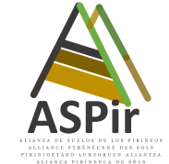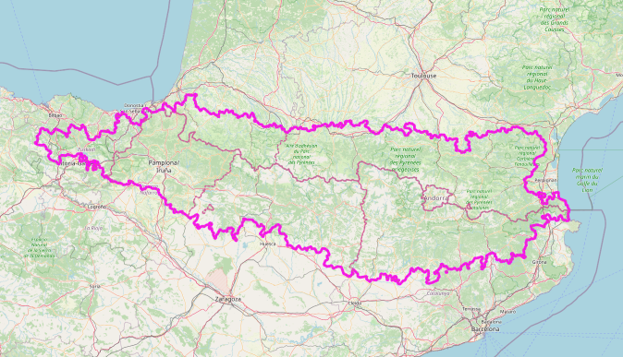Pyrenean Subregional Soil Partnership
Allianza de Suelos de los Pirineos (ASPir)

Official Website
https://ctp.org/es/alianza-de-suelos-de-los-pirineos-aspir/
https://www.opcc-ctp.org/fr/noticia/enquete-alliance-des-sols-pyreneens
SOLPYR project (2024-2026): https://solpyr.eu/proyecto/
Governance
Chair: Jokin del Valle de Lersundi, Spanish Society of Soil Science (SECS)
Vice-chair: Jacques Thomas, Association Française pour l’Étude du Sol (AFES)
Secretary: Agnès Lladós, Institut Cartogràfic i Geològic de Catalunya (ICGC)
Working Community of the Pyrenees (CTP): President Carole Delga, President of Occitanie (2023-2025), Secretary Yann Hélary, Representatives from the 7 regions (Nouvelle-Aquitaine, Aragon, Catalonia, Euskadi, Occitanie, Navarre, Principality of Andorra)
The Steering Committee is in charge of defining the strategic orientation (ToR) and monitoring ASPir activities. Coordinators of the working groups and a representative from each of the regions, ensure a maximum diversity of entities like public, private, associations, research organizations, natural parks.
Working groups:
GT1: Soil information
GT2: Dissemination - Awareness
GT3: Soil Degredation
General contact email: aspir.gsp@gmail.com
Countries
France, Spain, Andorra
Membership
Currently there are 46 partners from the 7 regions (from Spain, France and Andorra) (May 2025). Among the adherents there are mainly public administrations, universities, research centers, public companies, professional associations, natural parks and individuals.
About the specifics of the Pyrenees
The soils of the Pyrenees present an enormous soil diversity, with multiple functions and properties that must be guaranteed, conserved or restored, for the health of the ecosystem and human well-being. Faced with climate change and other environmental and anthropogenic threats, these soils are highly fragile, which makes them a non-renewable resource on a human scale.
The current situation of soil management in the Pyrenees is very heterogeneous, since they are spread over 3 countries and different regions or autonomous communities with very different laws and regulations. This situation generates the need to have agreed guidelines or principles of action with respect to soils, which allow applying sustainable management practices trying to balance the different demands for use in a harmonious way.
History
The Allianza de Suelos de los Pirineos (ASPir) was established on 27 May 2021 with the aim of harmonizing policies and actions related to Pyrenean soils, promoting and ensuring soil conservation and carbon sequestration as well as initatives on soil health. The partnership had 20 partners (incl. Institut d’Estudis Andorrans) at the time of the establishment.
- Collaboration with the IPROMO Summer School (focus on glaciers)
- 01/2024: Interreg grant for the implementation of SOLPYR – Soils from the Pyrenees. Knowledge for a better protection.
- IUSS Centennial Conference: Session on mountain soils including a post-conference tour
- 10/2024: Launch of the Interreg project “SOIL: OurInvisibleAlly”, that aims at implementing soil-related aspects in EU legislation in Alpine municipalities
- 11/2024: ASPir Seventh Assembly, New Steering Committee
- Celebration of the World Soil Day in the Aosta Valley region
- Submission of proposal for regional research project (SOLPYR 2024-2026), developed by the Association Française de l'Étude des Sols (AFAS) and the Sociedad Española de la Ciencia del Suelo (SECS)
- Local soil awareness raising, such as the dissemination of knowledge about soils of the public along the hiking trail of St. James
- 09/2023: Participation and Presentation of Acitivites at the XXXIII Spanish National Soil Meeting in Pamplona, Navarra
- 07/2022: ASPir Third Assembly
- 12/22: ASPir Fourth Assembly
- Development of work focus and funding opportunities
- 27/05/2021: ASPir First Assembly (online)
- 12/2021: ASPir Second Assembly
SOLPYR
The SOLPYR project, granted for the period from 01/2024 - 12/2026 as part of the programme POCTEFA (FEDER Funds) focuses on the vulnerability of mountain soils in relation to climate change and the consequences of mountain land uses. 9 partners are working together on this project.
Objectives:
- Provision of homogenous and consistent information on mountain soils in the region
- Prevention and analysation of soil degradation
- Definition of good practices for soil protection
- Creation of resources in terms of awareness raising for the public and mountain users
- Establishment of a network between Pyreneen organisations
More information can be found at the project website https://solpyr.eu/fr/projet/ (available in ES, FR)
